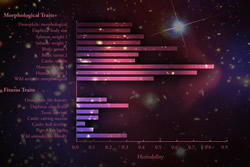Last updated: February 26, 2012
Finding the Missing Heritability of Complex Diseases
Finding the Missing Heritability of Complex Diseases

Hundreds of genetic variants have been linked to common diseases through genome-wide association studies, yet each confers only minimal disease risk. The findings thus far represent only the tip of the iceberg.
In February this year, the National Human Genome Research Institute convened a workshop, The Dark Matter of Genomic Associations With Complex Diseases: Explaining the Unexplained Heritability From Genome-Wide Association Studies, assembling experts to discuss how scientists might go about their search for the missing heritability involved in disease risk.
A summary of the workshop, including proposed research strategies, is the subject of a review article authored by NHGRI's Office of Population Genomics Director Teri Manolio, M.D., Ph.D., and workshop attendees, for the October 8 issue of Nature.
Abstract from the Nature paper
Genome-wide association studies have identified hundreds of genetic variants associated with complex human diseases and traits, and have provided valuable insights into their genetic architecture. Most variants identified so far confer relatively small increments in risk, and explain only a small proportion of familial clustering, leading many to question how the remaining, 'missing' heritability can be explained. Here we examine potential sources of missing heritability and propose research strategies, including and extending beyond current genome-wide association approaches, to illuminate the genetics of complex diseases and enhance its potential to enable effective disease prevention or treatment.
Read the Paper
Last Reviewed: February 26, 2012
